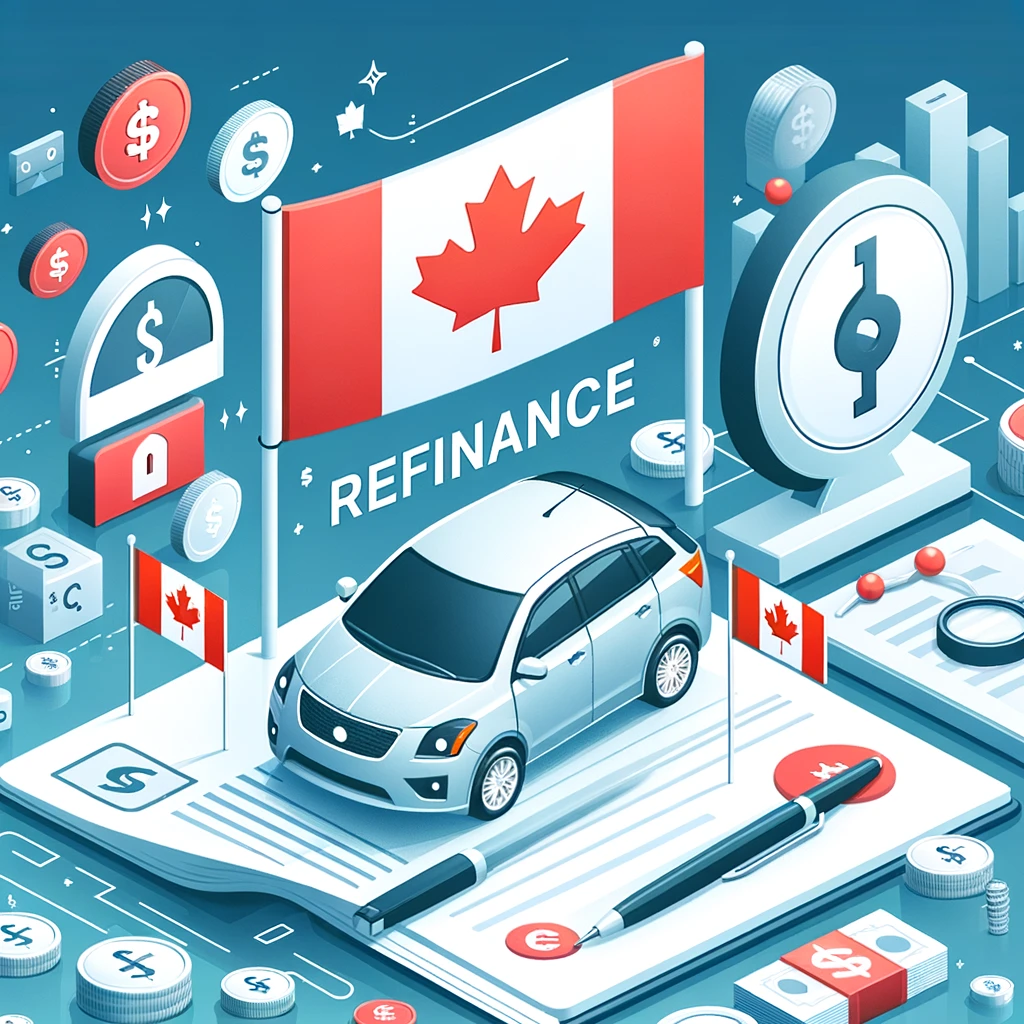Best Car Loans in Canada – Our Top Picks
What is car loan refinancing how does it work?
Car refinancing, also known as auto loan refinancing, is the process of replacing your existing car loan with a new loan, typically from a different lender, with revised terms and conditions. The primary goal of refinancing is to obtain more favorable terms than your current loan, which may include a lower interest rate, reduced monthly payments, or a shorter loan term.
Here’s how car refinancing works:
Evaluation of Current Loan: Start by reviewing the details of your current car loan, including the interest rate, remaining balance, and monthly payments. Assessing your current loan will help you determine whether refinancing could offer you better terms.
Credit Check: When you apply for car refinancing, the new lender will typically conduct a credit check to assess your creditworthiness. Your credit score plays a significant role in determining the interest rate and terms you qualify for. A higher credit score often results in more favorable refinancing options.
Comparison Shopping: Research and compare offers from different lenders to find the best refinancing deal. Look for lenders who offer competitive interest rates, favorable terms, and minimal fees. Consider both traditional financial institutions like banks and credit unions, as well as online lenders and specialized auto loan refinancing companies.
Application Process: Once you’ve chosen a lender, you’ll need to complete the application process. This typically involves providing personal information, details about your current loan, and documentation such as proof of income and vehicle registration. The lender will use this information to assess your eligibility for refinancing.
Loan Approval: If your application is approved, the new lender will provide you with a loan agreement outlining the revised terms of the refinanced loan. Review the terms carefully to ensure they meet your financial goals and objectives.
Loan Settlement: Upon approval, the new lender will pay off your existing car loan directly. This involves settling the remaining balance of your current loan, including any outstanding principal, interest, and fees. Your previous lender will receive the payment, and your car’s title will be transferred to the new lender.
Repayment Under New Terms: Once the refinancing process is complete, you’ll begin making payments to the new lender according to the revised terms of the loan. Depending on the terms you’ve secured, you may enjoy benefits such as lower monthly payments, reduced interest costs, or a shorter repayment period.
Overall, car refinancing offers borrowers the opportunity to improve their financial situation by securing more favorable loan terms. However, it’s essential to carefully evaluate the potential benefits and costs before proceeding with refinancing to ensure it aligns with your long-term financial goals.
How to refinance your car loan
Refinancing your car loan involves several steps to ensure you secure the most favorable terms. Here’s a detailed guide on how to refinance your car loan:
Evaluate Your Current Loan: Start by reviewing your existing car loan details, including the interest rate, remaining balance, and monthly payments. Assess whether refinancing could benefit you by potentially lowering your interest rate, reducing your monthly payments, or shortening the loan term.
Check Your Credit Score: Obtain a copy of your credit report and check your credit score. Lenders use your credit score to determine your eligibility for refinancing and the interest rate you qualify for. A higher credit score often results in better refinancing offers.
Research Lenders: Research and compare offers from various lenders, including banks, credit unions, online lenders, and specialized auto loan refinancing companies. Look for lenders that offer competitive interest rates, favorable terms, and minimal fees.
Gather Documentation: Collect the necessary documentation for the refinancing application process. This typically includes proof of income, vehicle registration, current loan details, and personal identification. Having these documents ready will streamline the application process.
Submit Applications: Apply for refinancing with multiple lenders to increase your chances of securing the best deal. Submit your applications online or visit lenders in person, depending on your preference. Provide accurate information and documentation to support your application.
Review Loan Offers: Once you receive loan offers from lenders, carefully review the terms and conditions, including the interest rate, loan term, monthly payment amount, and any fees involved. Compare offers to determine which one best suits your financial goals.
Choose a Lender: After reviewing the offers, select the lender that offers the most favorable terms and conditions for your refinanced car loan. Consider factors such as the interest rate, loan term, monthly payment amount, and overall cost.
Complete the Refinancing Process: Work with your chosen lender to complete the refinancing process. Provide any additional documentation requested and sign the necessary paperwork. The lender will then pay off your existing car loan and issue a new loan agreement with revised terms.
Verify Loan Settlement: Confirm that your previous lender receives the payoff amount from the new lender and closes your old car loan account. Ensure that the title of your vehicle is transferred to the new lender.
Start Making Payments: Once the refinancing process is complete, begin making payments to the new lender according to the terms of the refinanced loan. Set up automatic payments if available to ensure timely payments and avoid late fees.
Monitor Your Loan: Keep track of your refinanced car loan by monitoring your monthly statements and account activity. Stay informed about any changes in interest rates or loan terms and contact your lender if you have any questions or concerns.
By following these steps, you can successfully refinance your car loan and potentially save money on interest costs while improving your overall financial situation.
When is it beneficial to refinance your car loan?
Refinancing your car loan can be beneficial in several situations, depending on your financial goals and circumstances. Here are some scenarios in which refinancing may be advantageous:
Interest Rate Reduction: If interest rates have decreased since you initially took out your car loan or if your credit score has improved, you may qualify for a lower interest rate through refinancing. Lowering your interest rate can result in significant savings over the life of the loan, reducing your monthly payments and overall interest costs.
Improved Credit Score: If your credit score has improved since you obtained your current car loan, you may qualify for better loan terms, including a lower interest rate, through refinancing. Improvements in your credit score demonstrate to lenders that you are a more creditworthy borrower, which can lead to more favorable refinancing offers.
Reduced Monthly Payments: Refinancing your car loan can help lower your monthly payments by extending the loan term or securing a lower interest rate. This can free up more cash flow in your budget, allowing you to allocate funds to other financial priorities or expenses.
Shorter Loan Term: If you’re in a better financial position than when you originally took out your car loan and can afford higher monthly payments, refinancing to a shorter loan term can help you pay off the loan faster and save on interest costs. Shorter loan terms typically come with lower interest rates and can help you build equity in your vehicle more quickly.
Change in Financial Situation: If your financial situation has improved since you obtained your current car loan, refinancing can help you take advantage of better loan terms. Conversely, if you’re experiencing financial difficulties and need to lower your monthly payments, refinancing to a longer loan term may provide relief.
Consolidation of Debt: If you have other high-interest debts, such as credit card debt or personal loans, refinancing your car loan to consolidate debt can help simplify your finances and reduce your overall interest costs. By rolling multiple debts into a single, lower-interest loan, you can save money and pay off debt more efficiently.
Desire to Change Lenders: If you’re dissatisfied with your current lender’s customer service or policies, refinancing your car loan allows you to switch to a new lender that better meets your needs. Shopping around for refinancing offers gives you the opportunity to find a lender that offers better service, terms, and benefits.
Ultimately, the decision to refinance your car loan should align with your long-term financial goals and objectives. By carefully evaluating your current loan terms, comparing refinancing offers, and considering your financial situation, you can determine whether refinancing is the right choice for you.
Pros and cons of refinancing a car loan
Refinancing a car loan can offer various benefits, but it also comes with potential drawbacks. Here’s a detailed look at the pros and cons:
Pros of Refinancing a Car Loan:
Lower Interest Rate: One of the most significant advantages of refinancing is the potential to secure a lower interest rate. A lower interest rate can lead to substantial savings over the life of the loan, reducing your monthly payments and overall interest costs.
Reduced Monthly Payments: Refinancing can help lower your monthly payments by extending the loan term or securing a lower interest rate. This can free up more cash flow in your budget, making it easier to manage your finances.
Shorter Loan Term: Refinancing to a shorter loan term can help you pay off your car loan faster and save on interest costs. Shorter loan terms typically come with lower interest rates and allow you to build equity in your vehicle more quickly.
Improved Credit Score: Refinancing your car loan can help improve your credit score by demonstrating responsible credit management. Making timely payments on your refinanced loan can positively impact your credit history and score over time.
Consolidation of Debt: Refinancing your car loan to consolidate high-interest debt from other sources, such as credit cards or personal loans, can help simplify your finances and reduce your overall interest costs.
Change in Lender: Refinancing gives you the opportunity to switch to a new lender that offers better customer service, terms, and benefits. Changing lenders can improve your overall borrowing experience and satisfaction.
Cons of Refinancing a Car Loan:
Extended Loan Term: Refinancing to lower your monthly payments may result in an extended loan term, which means you’ll pay more in interest over the life of the loan. While lower monthly payments can provide short-term relief, you may end up paying more in the long run.
Additional Fees: Refinancing may involve fees such as loan origination fees, application fees, and prepayment penalties. These fees can offset the savings you gain from refinancing, so it’s essential to consider the total cost of refinancing before proceeding.
Impact on Credit Score: Applying for refinancing requires a hard inquiry on your credit report, which can temporarily lower your credit score. Additionally, closing your old car loan account may affect the average age of your credit accounts, potentially impacting your credit score.
Risk of Negative Equity: If you owe more on your car than it’s worth (negative equity), refinancing may not be feasible or may result in a higher loan balance. Be cautious of rolling negative equity into a new loan, as it can increase your financial risk.
Potential Loss of Benefits: Some car loans come with benefits such as gap insurance or extended warranties. Refinancing may result in the loss of these benefits if they are tied to your original loan agreement.
Overall, the decision to refinance your car loan should be based on a careful assessment of your financial situation, goals, and the potential benefits and drawbacks of refinancing. It’s essential to weigh the pros and cons and consider how refinancing aligns with your long-term financial objectives.
Car loan refinancing FAQs
Car loan refinancing involves replacing your existing car loan with a new loan from a different lender, typically with revised terms and conditions. The goal is to obtain more favorable terms, such as a lower interest rate or reduced monthly payments.
To refinance your car loan, you’ll need to apply with a new lender and undergo a credit check. If approved, the new lender will pay off your existing loan and issue a new loan agreement with revised terms. You’ll then make payments to the new lender according to the new terms.
Refinancing may be beneficial if you can secure a lower interest rate, reduce your monthly payments, or shorten the loan term. It’s a good idea to consider refinancing when interest rates are lower than when you obtained your original loan or if your credit score has improved.
While it may be more challenging to refinance a car loan with bad credit, it’s not impossible. Some lenders specialize in working with borrowers with less-than-perfect credit. However, you may face higher interest rates or less favorable terms compared to borrowers with good credit.
The amount you can save by refinancing depends on factors such as your current interest rate, the new interest rate, the remaining loan balance, and the loan term. You can use online calculators or work with lenders to estimate potential savings based on different refinancing scenarios.
Refinancing may involve fees such as loan origination fees, application fees, and prepayment penalties. It’s essential to consider these fees when evaluating the potential savings from refinancing. Some lenders may offer no-cost or low-cost refinancing options.
Applying for refinancing requires a hard inquiry on your credit report, which can temporarily lower your credit score. Additionally, closing your old car loan account may impact the average age of your credit accounts, which can also affect your credit score.
You typically cannot refinance a leased car because you don’t own the vehicle. However, you may be able to transfer the lease to another party or negotiate with the leasing company for alternative options.
The refinancing process can vary depending on the lender and individual circumstances. In general, it may take anywhere from a few days to a few weeks to complete the refinancing process, including the application, approval, and loan settlement.
While there’s no rule against refinancing your car loan multiple times, it’s essential to consider the potential impact on your credit score and overall financial situation. Refinancing too frequently may result in diminishing returns and could indicate financial instability to lenders.
In conclusion, refinancing your car loan in Canada can be a strategic financial move that offers numerous benefits, including lower interest rates, reduced monthly payments, and improved overall financial flexibility. By understanding the process of car loan refinancing and carefully evaluating your options, you can take control of your finances and potentially save money over the life of your loan.
Throughout this guide, we’ve explored the intricacies of car loan refinancing, from understanding what it is and how it works to determining when it’s beneficial and addressing common FAQs. We’ve discussed the importance of evaluating your current loan terms, researching lenders, and considering factors such as interest rates, fees, and loan terms.
Whether you’re looking to lower your monthly payments, reduce your interest costs, or shorten your loan term, refinancing offers a valuable opportunity to optimize your car loan and improve your financial situation. However, it’s essential to approach refinancing with careful consideration and to weigh the potential pros and cons before making a decision.
By following the steps outlined in this guide and working with reputable lenders, you can navigate the refinancing process with confidence and make informed decisions that align with your long-term financial goals. Remember to stay informed, compare offers, and prioritize your financial well-being as you explore the possibilities of refinancing your car loan in Canada.




















